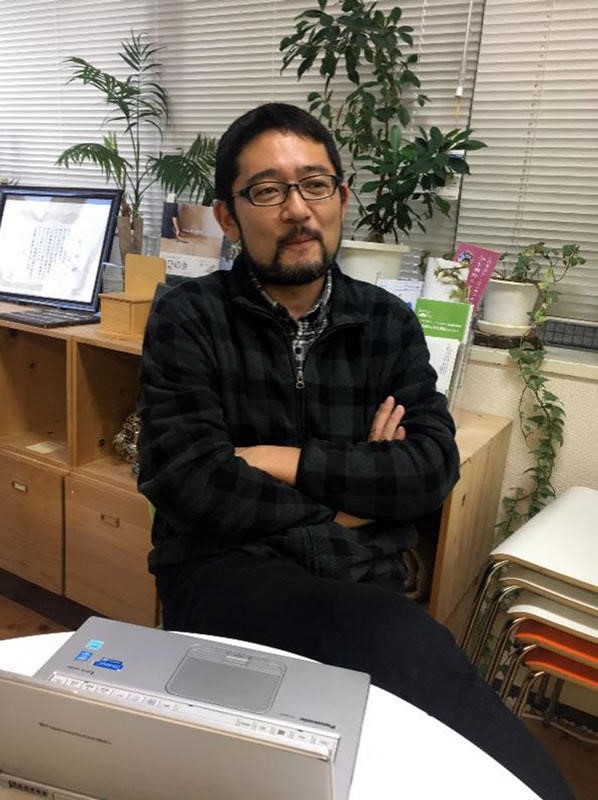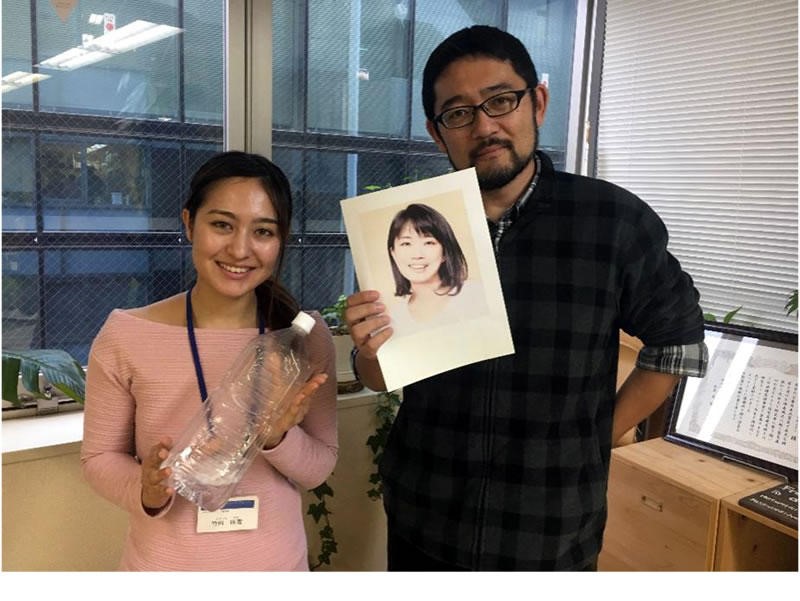[Original by Risa FUJII, 2018 Public Relations Intern/ Saki TAKEUCHI, 2018 Fundraising Intern (April 17, 2019); Translated by Y. Miki/S. Altman]

Mr. Ito smiled kindly. After all, he is a dad.
Hello, everyone! I am Fujii, the 2018 Public Relations Intern. This is actually the last page for me as an intern. Please enjoy it until the end. For the third round of staff interviews in 2018, I interviewed Kei Ito, our fundraiser and calendar designer/creator. Mr. Ito is the father of three daughters and he looks even more fatherly with this fleece on. This time, we would like to ask for details of how he entered an NGO for international cooperation from his previous freelance cameraman job.
What started your interest in international cooperation?
I became interested in international cooperation for the first time when I was in elementary school. I remember I used to say the words “international cooperation, forest conservation, and poverty eradication.” Even though I don’t know exactly why I said that, I’m sure I was vaguely interested in social problems. In my formative years at middle and high schools, I was fond of reding the comics “OISHINBO”, a Japanese manga about food. Since I was so influenced by that, I started having some thoughts like “agricultural chemicals are not good for both foods and producer’s health!” and “No additives!”. Since Japan imports a lot of food, the issues on food are not limited to Japan but extend to the world. My family ran a Chinese restaurant. There were always leftovers, which were too wasteful to discard. There were so many people in the world who were starving. This is what I felt.
When did you start photography?
I have been interested in photography since I was in junior high school. I had my father’s camera at home. However, I couldn’t handle it well because I had to adjust exposure and focus all manually. I was so frustrated that I bought my own single-lens reflex camera with my pocket money. It was when I was in the second grade of junior high school. Since then I belonged to a photography club in junior high school and continued into high school.
I was called Motsuke in high school (Motsuke means a person easily elated in Tsugaru dialect). I was an active boy and also belonged to the cheer team for sports alongside the photography club. Cheer teams of the high schools in Japan are famous for cheering at the baseball stadium, Koshien, where the Japanese High School Baseball Championships are held. However, our baseball team was weak and barely won a game. It was a shame for us that our efforts were not fully rewarded. My high school was a kind of preparatory school for university, but there was no university in my hometown. I could hardly imagine going to university. I knew nobody who graduated from university and I didn’t really want to study as well. Therefore, I decided not to go university but to enter a photography vocational school instead.
In the vocational school, we were divided into four courses (Portrait photography, Advertisement photography, News photography, and Fine-Art photography) in sophomore year. I mainly took pictures of flowers and landscape but was still interested in social issues. I pursued a career in the news photography field. The professor of the seminar which I belonged to was taking pictures of nuclear power plant for many years. I was influenced a lot by him and didn’t do job hunting. Instead of that, I thought I could keep doing photography based on my own theme. Around that period, I was somehow interested in poverty problems in the world. I found a career opportunity in an NGO and applied for it. It was actually around your age.
Please tell us about your time working as a photographer.
I worked at the NGO for about three years, but I did office work not related to photography. It was something that anybody could do. I thought it wouldn’t help me, if I don’t work in my field of specialization. This thought brought me back to the field of photography. I quit the NGO and started a new career in Pro Labo, a studio for film development for professional photographers and companies. I worked in a dark room and couldn’t get sunlight all day. I felt as if I was a bean sprout (haha). After working there for about 3 years, I started thinking that I would prefer to take photos rather than working behind the scenes. So, then I signed a contract with publishing photo department of a newspaper company and started working as a photographer.
Most of time, I was in charge of the on-camera interviews of politicians and or portrait photographing of some celebrities. The company also published medical magazines and books, so I shot footage of operations as well. Obviously, taking great pictures makes me feel so happy but other than that, the interesting part was also getting lots of unusual opportunities for instance I could be allowed to listen the minister’s interviews and I could go into the places that usually people can’t enter.
Around the time, my parents had cancer one after another. Since they got divorced, my father lived in Tokyo and my mother was in Aomori. Near the end of my contract, my dad passed away before I would be a free cameraman and I thought a lot whether I should go back to Aomori and take care of my mom or not. After all, I decided to stay in Tokyo because if I work as a free cameraman, I could get more time and I went back to Aomori when I had time. Since then, I went back to Aomori for a week every month and I had been back and forth between Tokyo and Aomori for about 4 years. I spent normal days during her treatment, but I didn’t want to waste time just doing nothing at my home, so I started taking photos of the landscape and the local events in Aomori. I gradually got a lot more photos so then I made the website page called “Tsugaru Style” and introduced about Tsugaru there. http://tsugarustyle.jp/
In the meantime, the Great East Japan Earthquake occurred. I tried to visit the devastated areas with my former NGO company’s coworkers. I helped with supplying blankets and daily necessities, but I was there mostly for photo shooting. I took pictures for the records for damage situation and activities. Those pictures were used as PR for donation and I heard that many donations were made. Until then, I had a lot of work photo shooting for some celebrities but from that time, I thought I would like to take pictures which can help people and I started an area guide job. I interviewed people, took pictures and wrote reports about it. Doesn’t it sound great, if the shops which I introduced on my website could get more customers through my website pages and the pictures there? I live in Ome city but there are actually so many good vibe cafes. It is a town where a lot of these cafes are off the radar; only people that know, know. I just wanted more people know about it so I opened my website, “Ome café – http://ome.town/cafe/”.
Please tell us the reasons why you joined JVC.
I often went to local areas for coverage and once I had work with a dolphin watching guide in Choshi in August 2017. While I was listening to the story of the person, I became curious about the meaning of the words he said, “I checked the website of my previous job with nostalgic feeling”. Thus, I started thinking about my last job where I used to belong, and I found the word “People who like photography” caught my eye while I was also wondering and checking how the current NGO industry is doing. I tried to check more about it with curiosity and it was actually recruitment information of the position for the staff in charge of JVC’s calendar. My daily motivation is “do something I can do” which means if even small actions that I take can help someone, I will do it as much as possible such as picking up garbage on the street. I didn’t mean to seek a job that adhered to this motto however, I applied for this position because I thought that if there was some way I could help, I would.
Please tell us your impression of JVC.
I believe the best thing about JVC is how staff is always being so nice. JVC staff and even volunteers warmly accept anyone from the start. Staff usually recognize a person and listen to their opinions. It won’t be something like “They are new here and they don’t know about anything. So, don’t listen to their opinions.” If we give them our opinion, they always listen closely. This kind of attitude is something that surely reflects this organization. Moreover, there are a lot of staff who left JVC but still often visit us and it proves that staff have great personal magnetism.
How do you think your experiences as a photographer contribute to this job?
As staff in charge of the calendar, I think I can take advantage of my experiences especially when I talk about photography with other photographers by using lots of technical words or when I select some photos. On the other hand, I personally define a cameraman who is taking photos at the scene, so someone who doesn’t do that is more like a decoration. So, I prefer to go and take some pictures of the scene there.
By the way, is the JVC calendar at your home?
I use JVC’s calendar (and the one I received from someone else) from this year. haha
Lastly, please leave a message to your juniors who have their eyes on international cooperation.
What I can say as a Tsugarushu (people who are from Tsugaru) which is considered one of my identities is, I would like you to root around not only for international cooperation but also as a chance to grow. I guess Palestinian and Kurdish people are good examples. Each one’s identity is really important to them and it would also make people face some problems. Ignoring their identities and pushing your own opinion on others will cause a fight, or in the worst case, a war or a conflict. To recognize others starts with acknowledging that everyone is different, which makes us question what we are. Caring too much that you are Japanese doesn’t mean that you’ll have to work for our country. Please make your perspective the first priority. Knowing about things you think are good or you don’t like, how you want to present yourself to others, and how you want to be seen are important for finding out who you really are. If the base is not firm enough, it breaks easily. If at least the base is firm enough, you can do well wherever you are.
Our impression after interview.

We’ve got a really strong message by his motto which is “do something I can do” many times while we were listening to his story before entering JVC. Also, when we started writing this article, we visited his websites that we found really cool. Please visit them! By the way, he used to be a writer, so he’s already proofread the completed sentences. haha (Fujii)
Mr. Ito has tried so many different things through his intuition and I’m glad we could hear lots of interesting stories, especially how he started his career at JVC. It seemed like there were lots of waves however his root was strong enough to get over difficulties. He usually drinks a two-liter bottled water at the office. (smiley face) (Takeuchi)
Next is, someone who Mr. Ito calls “JVC’s Kunoichi (female Ninja).” Please look forward to the next interview!
Share This: